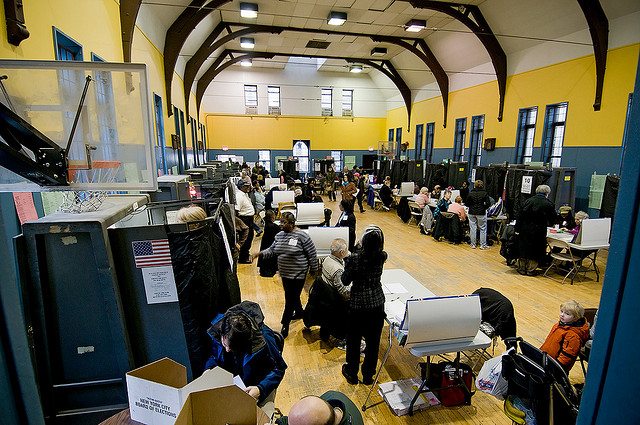“Voting is the building block of power.”
Stepping briskly, Elinor Hart, a volunteer for the local chapter of the League of Women Voters, moved around the meeting of the Coalition of Housing and Homeless Organizations (COHHO), gathering up the paperwork offered to her by homeless advocates and outreach workers.
Then Hart headed to the city Board of Elections and Ethics with the papers she had collected: more than 100 voter registration forms, completed by poor and homeless D.C. residents.
Homeless people are entitled to vote. But they may face barriers to making their voices heard. Since they live transient lives, their names may be purged from registration rolls. They may lack identification documents. Then there is the fact that they have no home address.
In the 1984 case known as Pitts v. Black, a federal court in New York explicitly found that homeless persons could not be denied the right to vote just because they did not live in a traditional residence. Subsequent cases from around the country have come to similar conclusions, the National Coalition for the Homeless points out in a manual for homeless voter registration.
But when a person does not even have a place to sleep at night, political involvement may be eclipsed by other concerns.
Nechama Masliansky, a senior advocacy advisor at the nonprofit So Others Might Eat (SOME) and co-convener for COHHO, understands the challenges. But she sees it as important for the poor and homeless to vote.
“Voting is the building block of power,” she said.
To build strength and show the poor and homeless clients at SOME and elsewhere in the city that their votes matter, she decided to work for wider voter registration.
“If we can come to the City Council and say that we have registered 1,000 people to vote in a city of 600,000 people, half of whom are children, it should have an impact,” she said.
With a little urging from Masliansky, SOME and other nonprofits got to work registering their clients. At SOME, 165 voter registration forms were filled out. At another program, Miriam’s Kitchen, 50 forms were completed. The People for Fairness Coalition, an organization of homeless people, registered 80 voters at Adams Place shelter alone.
Sometimes potential homeless voters were confused about how to fill out the forms or what address to use, said Masliansky.
Help was there for them, through the voter registration efforts.
“We didn’t take the pen, we didn’t do it for them,” said Masliansky. “But what goes in line one, what goes in line two, why are there two addresses in two lines on the forms? We tried to address these questions in person,” said Masliansky.
Some of the homeless people who were registering listed the addresses of the programs they attended, such as Miriam’s Kitchen and Adam’s Place Shelter, which is allowed under the law.
Then Hart, from the League of Women Voters, a nonpartisan organization seeking to educate citizens and encourage them to be informed and active participants in governmental issues, came to the COHHO meeting, collected the latest batch of forms and delivered them directly to the board of elections and ethics to be sure they did not get lost or mislaid.
The way Amanda Formica, a case manager at Miriam’s Kitchen, sees it, voting can be an antidote to disenfranchisement that sometimes goes with homelessness.
“Civic participation is a way to get outside of yourself,” she said. “Advocacy and voting can be a way to have people get involved with something bigger than themselves.”
Robert M. Day, who stays at Adams Place shelter, used that address for his registration form. He proudly showed off his new voter registration card.
“Filling out a form gives you a card, which gives you the vote, which gives you a voice in the city,” he said.
Miriam’s Kitchen helped people register, and explained why voting is so important and how their vote was a piece of empowerment for their voice to be heard, said Michael Fischer Jr., directory of advocacy.
Sylvia Randolph, 38, is a frequent visitor at Miriam’s Kitchen. She said she voted for the first time in the 2008 presidential election. Before President Obama, she thought voting didn’t matter.
“I felt like with Obama, my voice and opinion were heard,” she said.
Like Sylvia, Street Sense vendor L. Morrow, has been registered to vote for decades. He believes voting makes a difference. He said that by not voting you cannot make a difference, but the difference is made when you do vote.
Morrow remembers helping his grandfather vote for the first time. His grandfather couldn’t read or write. He helped him fill out the papers, so his grandfather could vote for the first time. “That’s why I cherish voting, because of my grandpa.”







